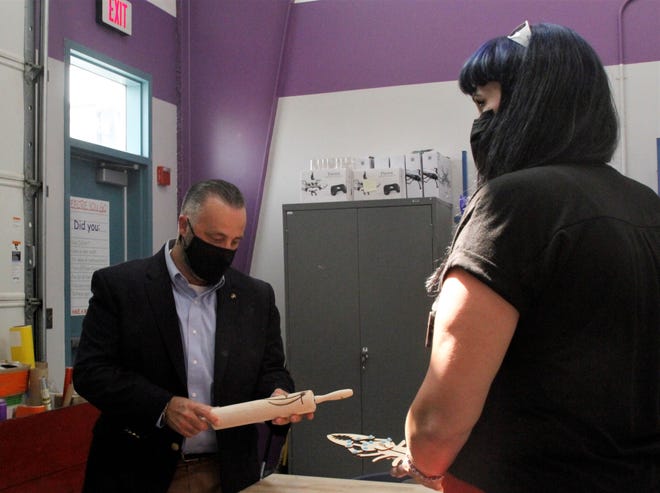SBA regional administrator discusses support available for business owners amid COVID-19

FARMINGTON — A month after Paycheck Protection Program loans had finished running their course, U.S. Small Business Administration Regional Administrator Justin Crossie came to Farmington as part of a regional tour to see how businesses had used these funds.
After stopping at a restaurant in Durango, Colorado, Crossie headed down to San Juan College on Sept. 16 before going to a hardware store in Farmington that received Paycheck Protection Program funds.
He said the Paycheck Protection Program "has been a lifeline for many small businesses for keeping their doors open, providing salaries for their staff so they don't have to lay people off."
Crossie described the tour as a fact-finding effort to learn how the program worked as well as what the SBA could do better and what businesses need from the SBA to continue moving forward in the new business climate.
"The one thing that has stood out to me wherever I have gone...is just the resiliency of the American small business owner," Crossie said. "They are not a risk-adverse group of people."
He said entrepreneurs are willing to take calculated risk and the biggest thing that he has seen during the tour is "businesses wanting to get back to business. They understand that there's safety concerns and they want to operate in a safe manner so that they can provide their services for their patrons, but they need their ... state or their local governments to allow them to go back to work in a responsible manner."

Current New Mexico health mandates are allowing businesses to operate at reduced capacity to prevent or reduce the spread of COVID-19, however the reduced capacity can translate to reduced revenue for some businesses.
In that area, Crossie said the Small Business Administration has counselors available to help business owners come up with creative solutions. He gave the example of a restaurant repurposing storage space so it could increase the dining area, which would allow more patrons to dine there.
While the Paycheck Protection Program was a lifeline to many small businesses, Crossie said on Aug. 8 that program "ran its course as far as what was authorized by Congress."
"Is there a need? I'm sure that there is still a need," he said. "That is something that Congress will need to act on. What I can tell you is that should Congress make that decision to move forward, we at the SBA stand ready to assist small business in whatever may be coming from Congress in the form of a Paycheck Protection Program extension."
But for now the Small Business Administration is focused on the training and other support options it can provide, including partnerships with small business development centers like the Quality Center for Business at San Juan College.

"We can put small businesses in touch with those resources, link them together to help them be successful," he said.
He encouraged business owners to go to sba.gov to find resources available to assist them at this time.
Crossie joined officials from the U.S. Department of Agriculture and Rural Development touring the Quality Center for Business, where he met with Four Corners Economic Development CEO Arvin Trujillo, learned about the Makers’ Space and visited the Harvest Food Hub prior to the distribution of locally-grown produce to community members.

The Makers' Space helps business owners who are just getting started by providing them access to tools that they may not otherwise have available. Meanwhile, the Harvest Food Hub provides farmers a place to sell their produce to the community.
During the tour, Trujillo told Crossie about some of the efforts 4CED has undertaken to diversify the economy, including promoting tourism and outdoor recreation and building partnerships for broadband and railroad initiatives.
USDA Rural Business Program Director Ray Melton said the Makers’ Space is a unique program in the state and the USDA would like to see similar programs emerge.
After visiting the Harvest Food Hub, he said he can think of several ways that the USDA could partner with the food hub and looks forward to working with them in the future. This includes support for value-added products as well as processing meat.
Hannah Grover covers government for The Daily Times. She can be reached at 505-564-4652 or via email at hgrover@daily-times.com.
Support local journalism with a digital subscription: http://bit.ly/2I6TU0e